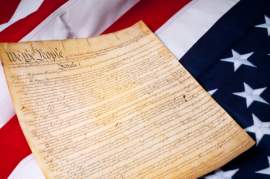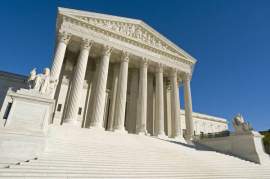
An Overview of the 13th Amendment

Popular In Constitution
Purpose Of Lifetime Appointment And Pros And Cons Enumerated Powers Bicameral Legislature Background Article 3 Of The Constitution We The People 1st Amendment Who Wrote The Constitution Judicial Review Equal Protection Clause 5th Amendment 10th Amendment Three Fifths Compromise
What is the 13th Amendment?
“Section 1. Neither slavery nor involuntary servitude, except as a punishment for crime whereof the party shall have been duly convicted, shall exist within the United States, or any place subject to their jurisdiction.
Section 2. Congress shall have power to enforce this article by appropriate legislation.”
The 13th Amendment Defined
Date Proposed
The 13th Amendment was proposed on January 31st, 1865
Date Passed
The 13th Amendment was passed on December 6th, 1865
President of the United States
Andrew Johnson was the President of the United States at the time of the ratification of the 13th Amendment; he assumes Presidency subsequent to the assassination of Abraham Lincoln
Stipulations of the 13th Amendment
The 13th Amendment declares slavery as illegal; in addition, forced servitude is also deemed to be illegal – this Amendment is regarded as the finalization of the abolishment of slavery
The 13th Amendment illustrates the distinction(s) between servitude, slavery, and consensual labor; forced labor is any type of labor that takes place through the implementation of threat(s), physically restraint of an individual with regard to the proliferation of labor, exploitative or blackmail –based activity in order to continue labor, and the implementation of fear in order to solidify servitude
‘Debt-servitude’ – or servitude implemented in order to force the repayment of debt is considered unconstitutional within the stipulations set forth within the 13th Amendment
13th Amendment Facts
The previous 12 Amendments were passed within the adoption of the Constitution of the United States
2 legal statures presenting punitive recourse with regard to the passing of 13th Amendment were enacted; the “Deprivation of Rights Under Color of Law” and “Conspiracy Against Rights”
The Emancipation Proclamation (1863) was issued by President Abraham Lincoln in the midst of the Civil War, which is considered to be the primary facilitator of the proposition – and subsequent ratification - of the 13th Amendment
States Ratifying the 13th Amendment
1. Alabama
2. Arkansas
3. California
4. Connecticut
5. Delaware
6. Florida
7. Georgia
8. Illinois
9. Indiana
10. Iowa
11. Kansas
12. Kentucky
13. Louisiana
14. Maine
15. Maryland
16. Massachusetts
17. Michigan
18. Minnesota
19. Mississippi
20. Missouri
21. Nevada
22. New Hampshire
23. New Jersey
24. New York
25. North Carolina
26. Ohio
27. Oregon
28. Pennsylvania
29. Rhode Island
30. South Carolina
31. South Dakota
32. Tennessee
33. Texas
34. Vermont
35. Virginia
36. Washington
37. West Virginia
38. Wisconsin
States Not Participatory in the Ratification of the 13th Amendment
Although failing to receive unanimous ratification, the 15th Amendment has since received subsequent – and collective – ratification from all applicable states
Statutes Associated with the 13th Amendment
The 13th Amendment – in addition to the 14th and 15th Amendments – is categorized as one of the 3 Constitutional Amendments regarded as ‘Reconstruction Amendments’; these Amendments took place within 5 years following the Civil War – they may also be referred to as ‘Civil War Amendments’
The 19th Amendment overturned preexisting stipulations that deny citizens of the United States the right to vote on the basis of gender; this amendment granted female citizens of the United States the right to vote.
NEXT: Fourteenth Amendment




















